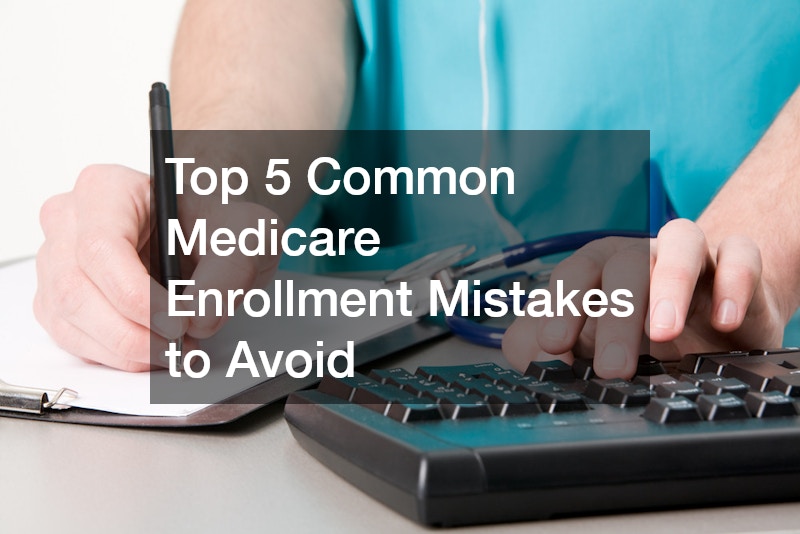
Navigating Medicare can be overwhelming, especially if it’s your first time signing up. While Medicare provides essential coverage for millions of Americans, mistakes during the enrollment process can lead to gaps in coverage, unexpected costs, or even penalties. Understanding the most common missteps can save you time, money, and frustration. In this article, we’ll highlight the top five Medicare enrollment mistakes to avoid so you can make the most of your healthcare coverage.
1. Missing the Initial Enrollment Period
One of the most common mistakes is missing the Initial Enrollment Period (IEP). This is a seven-month window that begins three months before your 65th birthday, includes your birthday month, and ends three months after.
Enrolling late can lead to late penalties, which may permanently increase your premiums.
It’s crucial to mark your calendar and prepare your documentation ahead of time. Social Security requires specific information such as proof of age, citizenship, and prior coverage. If you are still working and covered by employer insurance, make sure you understand how your existing plan interacts with Medicare. For instance, some employer plans coordinate with Medicare, while others require you to delay Part B enrollment to avoid double premiums. Missing this period is an easy mistake but one that can have lasting financial consequences.
2. Choosing the Wrong Coverage Plan
Medicare isn’t one-size-fits-all. Many people make the error of enrolling in a plan without fully considering their healthcare needs. Medicare consists of different parts—Part A (hospital insurance), Part B (medical insurance), Part C (Medicare Advantage), and Part D (prescription drug coverage).
Failing to evaluate which plan fits your specific health requirements can result in out-of-pocket costs or inadequate coverage. For example, someone who requires frequent specialist visits may benefit more from a Medicare Advantage plan that covers additional services rather than the standard Part A and B. Before making your selection, review your medical history, prescription needs, and preferred healthcare providers. Using online comparison tools or consulting with a licensed insurance agent can help you make an informed decision and avoid surprises later.
3. Ignoring Enrollment Period Deadlines
Even after the Initial Enrollment Period, there are other windows when you can sign up or make changes to your Medicare coverage. The General Enrollment Period (GEP) and the Open Enrollment Period (OEP) are two critical times to know about.
Ignoring these deadlines can lead to lapses in coverage or late enrollment penalties. For example, the GEP runs from January 1 to March 31 each year, and coverage doesn’t start until July 1. If you miss this window, you could face a permanent 10% penalty on your Part B premiums for every 12 months you delay enrollment. The OEP, which runs from January 1 to March 31 for those already enrolled in Medicare Advantage, allows switching plans but has specific rules. Staying on top of these dates ensures uninterrupted coverage and avoids unnecessary costs.
4. Not Considering Extra Help Programs
Another frequent mistake is overlooking programs that can help with costs. Medicare provides assistance through programs like Extra Help, which helps eligible individuals pay for prescription drugs, and Medicaid, which can cover additional medical expenses.
Failing to explore these options may mean paying more than necessary for coverage. If you have a limited income or high medical costs, check whether you qualify for these programs before completing your enrollment. Many people assume Medicare alone is sufficient, but taking advantage of additional support can reduce your financial burden significantly. Remember, these programs often have eligibility requirements, so early research and application can prevent missed opportunities for assistance.
5. Skipping Professional Guidance
Finally, many people try to navigate Medicare enrollment entirely on their own. While resources are available online, the rules can be complex, and a small oversight can lead to major consequences. Consulting a licensed insurance agent, a Medicare counselor, or even the Social Security Administration can provide valuable guidance tailored to your situation.
Professional advice ensures that you select the right plan, enroll on time, and avoid costly mistakes. Even if you feel confident, a second set of eyes can catch potential errors you might overlook. For instance, an agent can help determine whether a Medicare Advantage plan with lower premiums or a Medigap supplemental plan is more cost-effective for your health situation.
Enrolling in Medicare is a significant step in managing your healthcare, but mistakes can happen easily. Missing the initial enrollment period, choosing the wrong plan, ignoring deadlines, overlooking financial assistance programs, and skipping professional guidance are among the most common pitfalls. Being aware of these mistakes and planning ahead will help you secure the right coverage without unnecessary stress or expense.
By taking the time to understand your options, evaluating your health needs, and acting within the proper timelines, you can navigate Medicare enrollment confidently. Avoiding these common errors not only protects your finances but also provides peace of mind for your healthcare future. With careful planning and informed choices, you can make Medicare work for you rather than against you.




